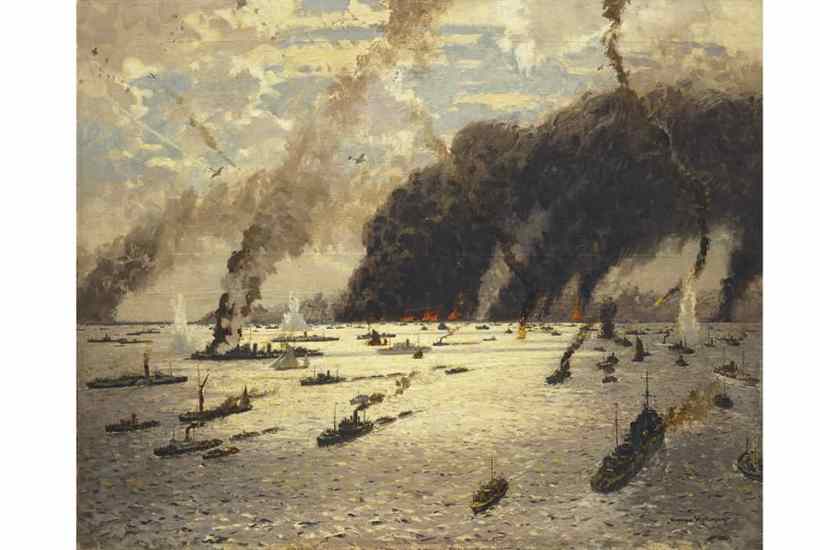‘I found this story by accident,’ begins Julia Jones’s Uncommon Courage, referring to documents belonging to her late father that she discovered in a far corner of her attic. True, but also false. This is not one story: it is a tsunami of stories. Sometimes it’s hard going, as you try to shelve the curiosity aroused by each tale. But the author writes with vim and vigour and with her own curiosity to the fore. It is all, appropriately, as far from dry as one could wish.
The imagination finds it difficult to yoke yachting with war – the one solitary and pacific, the other dense with people and mayhem – but the initial supposition that we shall be subjected to booms and topsails and rigging is soon scuppered. There is only a single actual sailing story, placed somewhere off the Levant, where one of Jones’s heroes, Adrian Seligman, was pretending to be a Greek fisherman. Rather, this is a book about yachtsmen who were members of the Royal Navy Supplementary Volunteer Reserve, the 2,000 or so gentlemen, and ‘temporary gentlemen’ who joined the service prior to, and at the outbreak of, the second world war.
Jones has tracked down and filleted written accounts of her yachtsmen’s war, including those by Nicholas Monsarrat, Nevil Shute and Ludovic Kennedy. My own favourite passage, which suggests the incongruities of which the book is full, is Ruari McLean’s reflection on a night in August 1944, as his submarine sailed towards Sumatra:
During the night my friend Edward Young passed close to us on his way in from patrol in his submarine Storm. If, five years previously when we were sharing a flat in Hammersmith and pursuing the peaceful profession of typography, we could have known that we would one night pass within a mile of each other in submarines in the Far East, we would have rushed down to the Black Lion with shaking hands to have a pint.
These remarkable men were vicars’ sons, lawyers, usually professionals of one kind or another, or just out of school and heading that way. They found themselves on depot ships, in tracking rooms, on minesweepers and gunboats or undertaking undercover operations. While Jones tells us of the capital warships to which occasionally they were attached, her emphasis is on stories of small ships and boats – wherries, folbots, puffers and drifters, yawls, tugs and sloops, ketches, cutters and corvettes.
She is admirably clear and concise about the contexts of the actions she describes, which include an eye-opening chapter on Dunkirk, the St Nazaire Raid, D-Day and others, ranging from the Arctic Circle to South Africa and from the Mediterranean to the Far East. But she is also happy to digress. There are paragraphs about 16-year-old Tommy Brown’s role in the capture of the Enigma key, and the U-Boat commander Werner Hartenstein’s vain attempts to rescue women and children from the Laconia, which he had just sunk.
While Uncommon Courage brims with tragedy, death and loss and grief and horror, the overwhelming sense is of the indomitability and selflessness of individuals driven by notions of virtue and duty and adventure.
Remarkably, what seemed to start as an esoteric story of little boats in war, of coastal defence and so on, becomes by the end a history of the conflict itself, told through a particular lens, offering alternatives to general knowledge. At sea, for example, there was no Phoney War. One of the many figures in the book who would merit a full biography, Fredman Ashe Lincoln, a devout Jewish lawyer already in Hitler’s Black Book at the war’s start, found himself, as early as November 1939, deducing the workings of German mines laid in the approaches to English harbours.
One of the other lives that threads this continuously astonishing book together is that of a distinguished Liverpool surgeon’s son, Nicholas Monsarrat. A pacifist who, despite being an enthusiastic sailor, opted first to serve as a London ambulance driver, he joined the RNVR following the military disasters of spring 1940 and months of his own inaction. He was 20 years old. He later wrote:
If anyone had told me, when I answered that Times advertisement for gentlemen with yachting experience, that as a result I would soon be stitching up a gashed throat without benefit of anesthetics, or trying to coax a dangling eyeball back into its socket; or if I had known that a man with a deep stomach wound, spread-eagled on what seemed like the very rack of Christ, could actually smell so awful, like an open drain, I might well have kept my yachting experience as secret as the grave, and settled for the Army Pay Corps or for prison or for shameful defeat itself.
Uncommon, indeed.
Got something to add? Join the discussion and comment below.
Get 10 issues for just $10
Subscribe to The Spectator Australia today for the next 10 magazine issues, plus full online access, for just $10.
You might disagree with half of it, but you’ll enjoy reading all of it. Try your first month for free, then just $2 a week for the remainder of your first year.














Comments
Don't miss out
Join the conversation with other Spectator Australia readers. Subscribe to leave a comment.
SUBSCRIBEAlready a subscriber? Log in